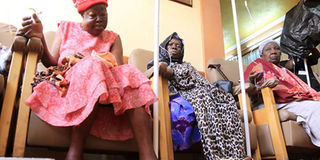Covid-19: Lessons from cancer patients

Cancer patients wait for chemotherapy treatment at Texas Cancer Center on December 7, 2016. PHOTO | FILE | NATION MEDIA GROUP
What you need to know:
- But for coronavirus we have an option to stop the spread. We do not have to take a gamble and die unnecessarily.
- Be responsible; take precautionary measures to avoid infection. We stay, cook and play at home, sometimes for months on end.
That Kenyans are whining about a night-time curfew and quarantine, spending days indoors and taking extra hygiene precautions to tame the spread of coronavirus baffles people living with cancer.
This is the typical life of cancer patients and their families. We are separated from our families for months, isolated in locked bedrooms, because our immunity is low.
We crave sitting on grass and having a normal talk. Sadness of separation from our children and parents hits us.
We nurse heartaches of missing out on the first months of our children’s lives. We wish we can breastfeed our children but we are in high dependency units (HDU).
But in solitude, our thoughts become louder; we re-evaluate our lives, find ourselves and what matters and renew our relationship with God and kin.
After we leave the hospital, we ‘social-distance’ since our families do not want to put us at risk of infection.
IN DENIAL
They sit away from us, stop hugging us, wear masks and sanitise their hands around us. They wash our vegetables with extra caution, sterilise the house and aerate the rooms.
They adhere to painstaking hygiene protocols for months or years.
We are frightened by the unknowns of treatment and the disease recurring but do not dwell on it. When you have a rare disease, at first you are optimistic that you will be okay.
Then panic kicks in and you worry that you will not be okay. If you test positive with coronavirus, do not dwell so much on the ‘What if?’.
We are in denial. When cancer signs start showing, we wish them away, with a Scripture wand.
But we continue seeing nightmarish changes in our bodies — weight loss, blood in urine and stool, bladder incontinence.
By the time we go to hospital, the cancer has burrowed into our bodies. This is a mistake that we regret daily.
SELF-ISOLATION
As coronavirus infection cases rise, so will the myths and fears that will delay treatment — a potential healthcare burden, especially in an ill-prepared country.
You have a higher chance of surviving if the disease is caught early.
We are quarantined in public hospitals with pathetic sanitation facilities for weeks as we do not want to harm our families and the community with remnants of the radioactive pill. But we survive.
So, as the coronavirus tally spikes and you find yourself quarantined in a public hospital or isolation centre, pray for grace, food and medicine; ideally, that is all you need. The rest are upper-tier Maslow’s hierarchy of needs.
We wait in line for treatment, sometimes up to a year, and some of us die even before we get admitted to hospital.
If Covid-19 cases spike, the pandemic will overpower healthcare workers, just as cancer has.
STAY SAFE
But for coronavirus we have an option to stop the spread. We do not have to take a gamble and die unnecessarily.
Cancer teaches us responsibility and selfishness, so will coronavirus. Be selfish and ask friends and family members who have travelled recently to self-quarantine.
Be responsible; take precautionary measures to avoid infection. We stay, cook and play at home, sometimes for months on end.
The Covid-19 pandemic will reshape the world in a way that cancer, which kills 8.2 million people yearly, has not.
But it is an opportunity to prioritise primary healthcare and equip public hospitals for non-communicable diseases and any other post-Covid-19 pandemic.
Ms Mwango an editor at Business Daily and a cancer survivor. [email protected].





